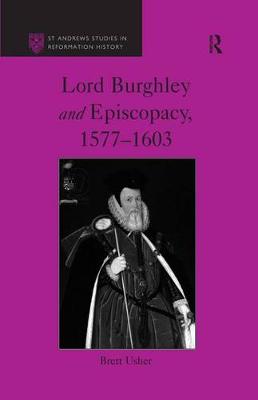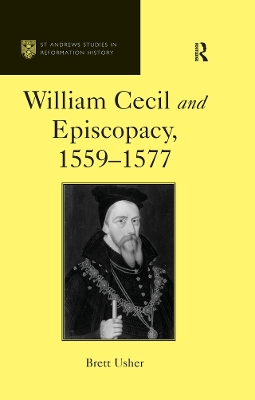St Andrews Studies in Reformation History
2 total works
Lord Burghley and Episcopacy, 1577-1603 examines the selection and promotion of bishops within the shifting sands of ecclesiastical politics at the Elizabethan court, drawing on the copious correspondence of leading politicians and clerical candidates as well as the Exchequer records of the financial arrangements accompanying each appointment. Beginning in 1577, the book picks up the narrative where Brett Usher's previous book (William Cecil and Episcopacy, 1559-1577) left off, following the fall of Archbishop Grindal, which brought the Elizabethan church to the brink of disaster. The book begins with an outline of the period under review, challenging the traditional view of corruption and decline. Instead Usher provides a more complex picture, emphasizing the importance of court rivalries over patronage and place, and a broadly more benign attitude from the Exchequer, which distinguishes the period from the first half of the reign. Within this milieu the book situates the dominance of the Cecils - father and son - in ecclesiastical affairs as the key continuity between the two halves of Elizabeth's reign. Providing a fresh analysis of the Burghley's long and influential role within Elizabethan government, Usher both illuminates court politics and the workings of the Exchequer, as well as the practical operation of Elizabeth's supremacy. Specifically he demonstrates how Elizabeth learnt a valuable lesson from the debacle over the fall of Grindal, and from the late 1570s, rather than taking the lead, customarily she looked to her councillors and courtiers to come to some accommodation with each other before she would authorize appointments and promotions. Note: Brett Usher died in 2013 before the publication of this book. Final editing of the typescript was undertaken by Professor Kenneth Fincham of the University of Kent, who also guided the book through the publication process.
The figure of William Cecil dominates the court of Elizabeth I, and next to the queen herself, no one did more to shape the political, religious and economic landscape of late sixteenth century England. Nowhere is this influence more evident than in the ecclesiastical settlements that Elizabeth imposed on a country wracked by religious divisions and uncertainty. At the very heart of this settlement lay the question of the role of the bishops, and it is to this problem that Cecil was to devote much time and energy. Broadening our understanding of the Elizabethan Church, this study utilises a number of hitherto underused primary sources to re-examine the vexed issue of the role of bishops. It addresses the question of why certain men were appointed bishops whilst others, often seemingly better qualified, were passed over. Taking a broadly chronological approach, this book argues that Cecil, a committed protestant, hoped to remodel espiscopacy along 'reformed' continental lines. Rather than great princes of the church, Cecil envisaged 'superintendents' shorn of much of their traditional temporal power and wealth. Charting the first two decades of Elizabeth's reign it is shown how Cecil tried to convince the queen to abandon the established economic foundations of 'prelacy' in favour of a properly funded superintendency. In this he failed. Yet as long as Cecil remained a dominating voice at the council table the Church of England, through the mediation of a bench of conscientious and hard-working (if often hard-pressed) bishops, was assured of a broad base and an evangelical future. The remainder of Cecil's career, from 1577 to 1598, will be dealt with in a subsequent volume Lord Burghley and Episcopacy.

